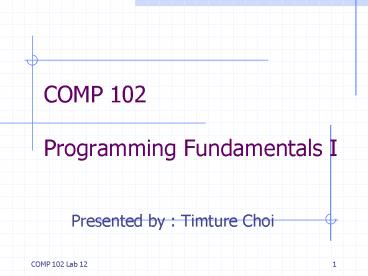COMP 102 Programming Fundamentals I PowerPoint PPT Presentation
1 / 15
Title: COMP 102 Programming Fundamentals I
1
COMP 102Programming Fundamentals I
- Presented by Timture Choi
2
Searching
- The process used to find the location of a target
among a list - Searching an array finds the index of first
element in an array containing that value
3
Example
4
1. Unordered Linear Search
- Search an unordered array of integers for a value
- If the value is found
- Return its index
- Otherwise
- Return -1
- Unordered array
5
1. Unordered Linear Search
- Algorithm
- Start with the first array element (index 0)
- while (more elements in array)
- if value found at current index
- return index
- else
- Try next element by incrementing index
- return -1 //if value not found
6
1. Unordered Linear Search
- E.g.
// output // if found gt index // otherwise
gt return -1 int search(int datasize, int size,
int value) for (int index0 indexltsize
index) if (dataindex value)
cout ltlt "Value found at index "
ltlt index ltlt endl return index
return -1
7
2. Ordered Linear Search
- Ordered array
- Algorithm
- Start with the first array element (index 0)
- while (more elements in the array)
- if value at current index is greater than value
- value not found
- return 1
- if value found at current index
- return index
- Try next element by incrementing index
- return 1 //if value not found
- Advantage
- Linear search can stop immediately
- when it has passed the possible position of the
search value
8
2. Ordered Linear Search
- E.g.
int lsearch(int data, int size, int value)
for(int index0 indexltsize index) if
(dataindex gt value) return -1
else if (dataindex value) return
index return -1
9
3. Binary Search
- Start by looking at the middle element of an
ordered array - If the value it holds is lower than the search
element - Eliminate the first half of the array from
further consideration - If the value it holds is higher than the search
element - Eliminate the second half of the array from
further consideration - Repeat this process
- Until the element is found
- OR until the entire array has been eliminated
- Advantage
- Binary search skips over parts of the array
10
3. Binary Search
- Algorithm
- Set first and last boundary of array to be
searched - Repeat the following
- Find middle element between first and last
boundaries - if (middle element contains the search value)
- return middle element position
- else if (first gt last )
- return 1
- else if (value lt the value of middle element)
- set last to middle element position 1
- else
- set first to middle element position 1
11
3. Binary Search
int bsearch(int data, int size, int value)
int first, middle, last // indexes to the array
first 0 last size - 1 while (true)
middle (first last) / 2 if
(datamiddle value) return middle
else if (first gt last) return
-1 else if (value lt datamiddle)
last middle - 1 else
first middle 1
- E.g.
12
Recursion
- Typically, a functions can call other functions
to do part of the work - But functions can also call themselves
- Recursion
- In some problems
- It may be natural to define the problem in terms
of the problem itself - E.g.
- Factorial function
- 6! 6 5 4 3 2 1
- With recursion
- 6! 6 5!
13
Recursion
- In general
- if n is larger than 1
- n! n (n-1)! // recursive formula
- if n is equal to 1
- n! 1 // termination condition
- The C equivalent of this definition
int fac(int numb) if (numb lt 1) return
1 else return numb fac(numb-1)
14
Recursion
- Advantage
- For certain problems
- E.g. the factorial function
- Leads to short and elegant code
- Disadvantage
- Calling a function consumes more time and memory
than adjusting a loop counter - Note
- Must be careful not to create an infinite loop by
accident - Contain termination condition
15
SUMMARY
- By the end of this lab, you should be able to
- Search an element from an array with
- Unordered linear search
- Ordered linear search
- Binary search
- Write recursive function

